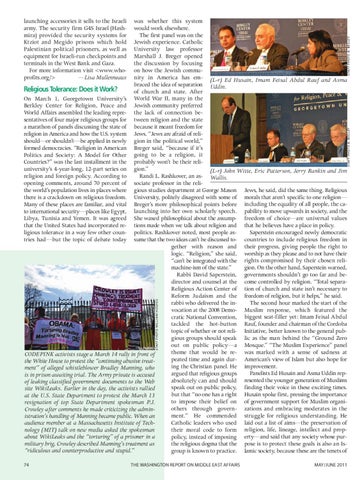STAFF PHOTO WILLIAM HUGHES
74
THE WASHINGTON REPORT ON MIDDLE EAST AFFAIRS
MAY/JUNE 2011
STAFF PHOTO A. BEGLEY
was whether this system would work elsewhere. The first panel was on the Jewish experience. Catholic University law professor Marshall J. Breger opened the discussion by focusing on how the Jewish community in America has em- (L-r) Ed Husain, Imam Feisal Abdul Rauf and Asma braced the idea of separation Uddin. Religious Tolerance: Does it Work? of church and state. After On March 1, Georgetown University’s World War II, many in the Berkley Center for Religion, Peace and Jewish community preferred World Affairs assembled the leading repre- the lack of connection besentatives of four major religious groups for tween religion and the state a marathon of panels discussing the state of because it meant freedom for religion in America and how the U.S. system Jews. “Jews are afraid of relishould—or shouldn’t—be applied in newly gion in the political world,” formed democracies. “Religion in American Breger said, “because if it’s Politics and Society: A Model for Other going to be a religion, it Countries?” was the last installment in the probably won’t be their reliuniversity’s 4-year-long, 12-part series on gion.” (L-r) John Witte, Eric Patterson, Jerry Rankin and Jim Randi L. Rashkover, an as- Wallis. religion and foreign policy. According to opening comments, around 70 percent of sociate professor in the relithe world’s population lives in places where gious studies department at George Mason Jews, he said, did the same thing. Religious there is a crackdown on religious freedom. University, politely disagreed with some of morals that aren’t specific to one religion— Many of these places are familiar, and vital Breger’s more philosophical points before including the equality of all people, the cato international security—places like Egypt, launching into her own scholarly speech. pability to move upwards in society, and the Libya, Tunisia and Yemen. It was agreed She waxed philosophical about the assump- freedom of choice—are universal values that the United States had incorporated re- tions made when we talk about religion and that he believes have a place in policy. Saperstein encouraged newly democratic ligious tolerance in a way few other coun- politics. Rashkover noted, most people astries had—but the topic of debate today sume that the two ideas can’t be discussed to- countries to include religious freedom in gether with reason and their progress, giving people the right to logic. “Religion,” she said, worship as they please and to not have their “can’t be integrated with the rights compromised by their chosen religion. On the other hand, Saperstein warned, machine-ism of the state.” Rabbi David Saperstein, governments shouldn’t go too far and bedirector and counsel at the come controlled by religion. “Total separaReligious Action Center of tion of church and state isn’t necessary to Reform Judaism and the freedom of religion, but it helps,” he said. The second hour marked the start of the rabbi who delivered the invocation at the 2008 Demo- Muslim response, which featured the cratic National Convention, biggest seat-filler yet: Imam Feisal Abdul tackled the hot-button Rauf, founder and chairman of the Cordoba topic of whether or not reli- Initiative, better known to the general pubgious groups should speak lic as the man behind the “Ground Zero out on public policy—a Mosque.” “The Muslim Experience” panel theme that would be re- was marked with a sense of sadness at CODEPINK activists stage a March 14 rally in front of peated time and again dur- American’s view of Islam but also hope for the White House to protest the “continuing abusive treating the Christian panel. He improvement. ment” of alleged whistleblower Bradley Manning, who Panelists Ed Husain and Asma Uddin repargued that religious groups is in prison awaiting trial. The Army private is accused absolutely can and should resented the younger generation of Muslims of leaking classified government documents to the Web speak out on public policy, finding their voice in these exciting times. site WikiLeaks. Earlier in the day, the activists rallied but that “no one has a right Husain spoke first, pressing the importance at the U.S. State Department to protest the March 13 to impose their belief on of government support for Muslim organiresignation of top State Department spokesman P.J. others through govern- zations and embracing moderates in the Crowley after comments he made criticizing the adminment.” He commended struggle for religious understanding. He istration’s handling of Manning became public. When an Catholic leaders who used laid out a list of aims—the preservation of audience member at a Massachusetts Institute of Techtheir moral code to form religion, life, lineage, intellect and propnology (MIT) talk on new media asked the spokesman about WikiLeaks and the “torturing” of a prisoner in a policy, instead of imposing erty—and said that any society whose purmilitary brig, Crowley described Manning’s treatment as the religious dogma that the pose is to protect these goals is also an Is“ridiculous and counterproductive and stupid.” group is known to practice. lamic society, because these are the tenets of launching accessories it sells to the Israeli army. The security firm G4S Israel (Hashmira) provided the security systems for Ktziot and Megido prisons which hold Palestinian political prisoners, as well as equipment for Israeli-run checkpoints and terminals in the West Bank and Gaza. For more information visit <www.whoprofits.org/> —Lisa Mullenneaux
STAFF PHOTO A. BEGLEY
activisms_62-75_May/June 2011 Activisms 4/12/11 8:37 PM Page 74
